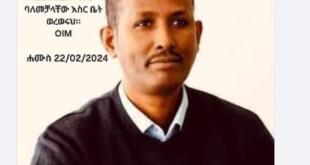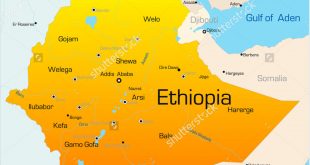Tsegaye Ararssa
Yes, it is a sad day in Ethiopia. But what day wasn’t a sad day for Oromos in Ethiopia for the last 150 years?
What day wasn’t a sad day for Oromos when, only in the last four years, over 5000 peoples were killed; thousands were wounded; tens of thousands arrested, detained, and tortured; hundreds of thousands were evicted; and millions were displaced?
What day was not a sad day for Oromos when, only in the last one year, the worst and meanest insults and racist slurs were hurled at Oromo persons on virtually every Ethiopian(ist) media, social and conventional?
What day wasn’t a sad day for Oromos when the people’s demands for social justice were ignored, sidelined, ridiculed, and/or denied and erased otherwise?
What day wasn’t a sad day for Oromos when every passing day was a day of violence and war mongering against anyone and anything Oromo in Ethiopia and beyond?
What day wasn’t a sad day when, virtually every day, Oromos are subjected to overt violence (discursive and physical) in the face of a government that has nothing better to do than appeasing Amhara supremacist forces?
What wasn’t a sad day when lawlessness has been enacted by para-statal operatives who occupy poor farmers’ lands at whim only to displace them and, eventually, claim the land as part of the measures taken to satisfy their ambitions of territorial expansion?
What day wasn’t a sad day when demanding for equality and justice was framed as ‘extremism,’ ‘tribalism,’ anti-ethiopianism, etc, if only to deny, contain, and silence the pain and suffering of the oppressed peoples of Ethiopia?
Yes, it has always been a sad day for Oromos and the entire Southern half of the country.
Any day has been a sad day of mis-recognition, erasure, invisibility, inequality and injustices of all sorts.
Any day has been a sad day when Amhara supremacists of a long frustrated empire take it out on Oromos, always considering them as an object, and a target, of their genocidal predilection.
And yet, as a voice of the people of hope and redemption, ours was the voice calling for some semblance of legality, for some sort of legal restraint on the basest of instincts unleashed onto the political sphere.
Ours was a voice against the hatred, prejudice, bigotry, and violence of supremacists.
To dramatize the incident of today and portray it as the saddest day, as if it is the single most important pain felt in the polity, is to quietly erase and invisibilize the temporally and spatially much wider pain and suffering written into the very core, to the material body, of the Ethiopian body politic.
It is important that we begin to speak explicitly about the violence emanating from supremacist (and a resurgent imperial) politics. It is necessary to pick on them and expose the utter indefensibility of their politics, the moral hollowness of their logic, and the ethical bankruptcy of their practice. Unless we pick on these instincts, unless we name them for what they are, and unless we shame and punish them otherwise, the violence we saw today will continue untill the country becomes a bloodbath.
It’s tragic that this hatred has started to manifest itself today by claiming the lives of senior military and political leaders in the country. For ordinary Oromos and the wider South of Ethiopia, this tragedy was an everyday experience at once singular and regular, incidental and structural (i.e., built into the structure of relations between them and the state).
It is ironic (in part) that, this time, the tragedy claimed persons (also) from the same group that foments the violence.
Tragic? Surely. Sad? Yes. Singular? No.
Singular or regular, incidental or structural, one can’t help wondering if this is perhaps the case of the proverbial “chickens coming home to roost”, or if it is only the beginning something worse?




